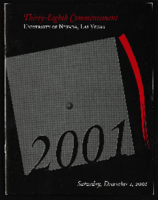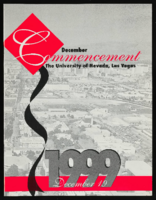Search the Special Collections and Archives Portal
Search Results

Pom Fritz oral history interview: transcript
Date
Archival Collection
Description
Oral history interview with Pom Fritz conducted by Kristel Peralta and Stefani Evans on June 8, 2021 for Reflections: The Las Vegas Asian American and Pacific Islander Oral History Project. Pom talks about her family and upbringing in Udon Thani, Thailand and her immigration to the United States with her second husband, an American citizen, in 1972. She discusses living on Air Force bases in North Carolina and California before moving to Las Vegas and finding work at different hotels. Pom shares her experiences as a member, steward, and executive board representative of the Culinary Workers Union and what she recalls from the Frontier Strike. She also talks about her children and grandchildren, some of whom still live in Thailand.
Text

Mach and Arlene Manuel oral history interview: transcript
Date
Archival Collection
Description
Oral history interview with Mach and Arlene Manuel conducted by Kristel Peralta and Stefani Evans on June 28, 2021 for Reflections: The Las Vegas Asian American and Pacific Islander Oral History Project. Mach and Arlene Manuel share the story of their overseas courtship and how they came to be together in the United States. Arlene was raised in the Philippines while Mach was born and raised in San Diego, California. Mach describes his visit to the Philippines as an adult when he began to connect more to his Filipino heritage. The couple shares how they dated for 13 years before Arlene moved to San Diego, and how the Manuel family came to live in Las Vegas in 2017 to pursue Arlene's nursing career. Arlene and Mach talk about cultural differences and discrimination, emigration and diversity, religion and identity, and Filipino food, among other topics. Subjects discussed include: Manila, Philippines; discrimination of class; and anti-Asian hate.
Text

Rodrigo Vazquez oral history interview: transcript
Date
Archival Collection
Description
Oral history interview with Rodrigo Vazquez conducted by Nathalie Martinez and Barbara Tabach on May 24, 2021 for the Latinx Voices of Southern Nevada Oral History Project. Rodrigo was raised in a mixed status Mexican family. He was born in Mexico and immigrated to the United States at the age of three, later becoming a citizen when he was in the 8th grade. Rodrigo is currently a graduate student worker for the Latinx Voices Oral History Project and reflects on what he has learned. He also discusses what the past year of the Coronavirus pandemic has been like for him. Subjects discussed include: Latinx and Mexican identities, COVID-19 era, and Latinx Voices Project oral historian.
Text

Michael Chin oral history interview: transcript
Date
Archival Collection
Description
Oral history interviews with Michael Chin conducted by Jerwin Tiu, Cecilia Winchell, and Stefani Evans on December 20, 2022 and January 12, 2023 for Reflections: the Las Vegas Asian American and Pacific Islander Oral History Project. In this interview, Chin describes growing up in a largely Americanized household. His paternal grandparents immigrated from China and owned a laundry shop that his father worked in as well. Chin discusses his education and his interest in creative writing, including editing the school newspaper and writing an a cappella blog with his friend while in college. After graduating, he worked at the John Hopkins Center for Talented Youth as a resident assistant before getting into a graduate program and obtaining his MFA.
Text

Krystal Ramirez oral history interview: transcript
Date
Archival Collection
Description
Oral history interview with Krystal Ramirez conducted by Monserrath Hernández and Barbara Tabach on October 30, 2019 for the Latinx Voices of Southern Nevada Oral History Project. Krystal talks about her personal history growing up in Texas and spending summers with her family in Mexico. She shares her thoughts about how Las Vegas has changed and how she has contributed to the city's art scene as a staff photographer for Vegas Seven (a local magazine), the New York Times, and the Marjorie Barrick Museum. Subjects discussed include: Texas; Chihuahua, Mexico; Latinx Identity; Vegas Seven; Beat Coffee House; Downtown Las Vegas.
Text

Gregory Koehler oral history interview: transcript
Date
Archival Collection
Description
Oral history interview with Gregory Koehler conducted by Claytee D. White on May 15, 2019 for the Remembering 1 October Oral History Project. Koehler begins talking about his family, early life, and occupation. He explains the line of jobs he has had, his history with firefighting, and how he moved to Las Vegas, Nevada in 2003. Koehler then recalls how he had attended the Route 91 Festival concert and the events that unfolded during the shooting. He describes what he saw, felt, and how he tried to help the people who were shot. Lastly, he talks about the aftermath of the event and the struggles he had gone through.
Text

University of Nevada, Las Vegas (UNLV) 38th commencement program
Date
Archival Collection
Description
Commencement program from University of Nevada, Las Vegas Commencement Programs and Graduation Lists (UA-00115).
Text

University of Nevada, Las Vegas (UNLV) 36th commencement program
Date
Archival Collection
Description
Commencement program from University of Nevada, Las Vegas Commencement Programs and Graduation Lists (UA-00115).
Text

Sandra Candel oral history interview: transcript
Date
Archival Collection
Description
Oral history interview with Sandra Candel conducted by Elsa Lopez, Monserrath Hernández, and Barbara Tabach on October 03, 2019 for the Latinx Voices of Southern Nevada Oral History Project. Sandra Candel talks of her childhood growing up with her grandparents in Guadalajara, Jalisco after her mother immigrated to America. She moved to California to attend university before moving to Salt Lake City, Utah, where she raised her children and began homeschooling them. This path led to Sandra opening a Montessori school, igniting her interest in education. She talks of her pursuit of both a Masters Degree from Drexel University and a Doctoral Degree from the University of Nevada, Las Vegas (UNLV). Sandra concludes her interview with discussion of her research and current employment as a part-time instructor for the Department of Interdisciplinary, Gender, and Ethnic Studies at UNLV. Subjects discussed include: Guadalajara; Salt Lake City, Utah; Sensitive Teaching Practices; Multi-generational families.
Text

Anita Tijerina Revilla oral history interview: transcript
Date
Archival Collection
Description
Oral history interview with Anita Tijerina Revilla conducted by Marcela Rodriguez-Campo on October 09, 2018 for the Latinx Voices of Southern Nevada Oral History Project. In this interview, Revilla discusses her early life in San Antonio, Texas. She talks about her decision to make education a priority, figuring out the college application process on her own, and her initial interest in social justice. Revilla talks about how her critical consciousness was developed, and her pedagogical approach to teaching. Revilla describes her role in the 2006 May Day march, advocating advocating for the queer community, and disrupting oppressive systems to increase educational access for students. Lastly, Revilla discusses ethnic studies and the history of inequality in the United States.
Text
